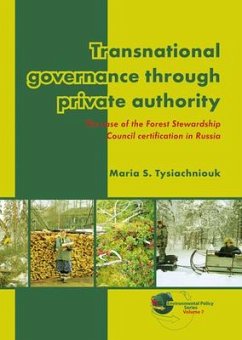This book provides a novel approach for understanding and analyzing transnational governance by private authorities. It brings together theoretical and empirical insights by introducing a new master concept: governance generating networks (GGN). These networks comprise three structural elements: (1) nodes of design, where global standards are developed; (2) forums of negotiation, where stakeholders discuss and negotiate the standards; and (3) sites of implementation, where global rules are transferred into concrete practices on the ground. This concept captures both transnational processes and local practices that take place in the sites of implementation, involving local actors and stakeholders as they react and adjust to the new global standards. The book focuses on forest governance through the Forest Stewardship Council (FSC) certification scheme, investigating implementation of FSC standards in Russia. Using several case studies in which the GGN concept is used as an analytical tool, this study assesses how global governance through the FSC contributes to forest governance in Russia, and to what extent it fills an institutional void by giving voice to private actors and enabling them to foster sustainable forest management. Scholars of political science, sociology, and related disciplines as well as practitioners, such as NGO activists, company representatives, FSC experts, managers and auditors, will find valuable insights, both theoretical and empirical, in this empirically rich and theoretically innovative study.
Hinweis: Dieser Artikel kann nur an eine deutsche Lieferadresse ausgeliefert werden.
Hinweis: Dieser Artikel kann nur an eine deutsche Lieferadresse ausgeliefert werden.








